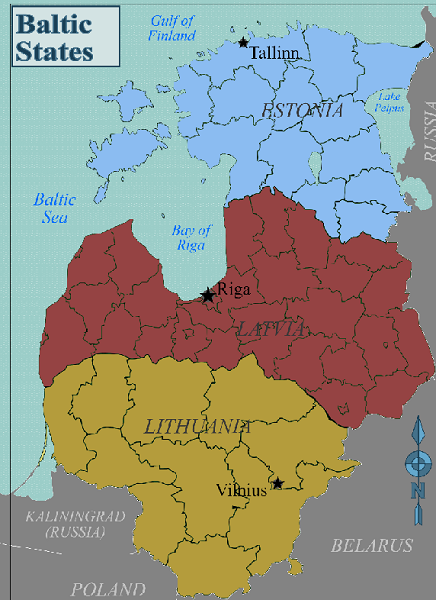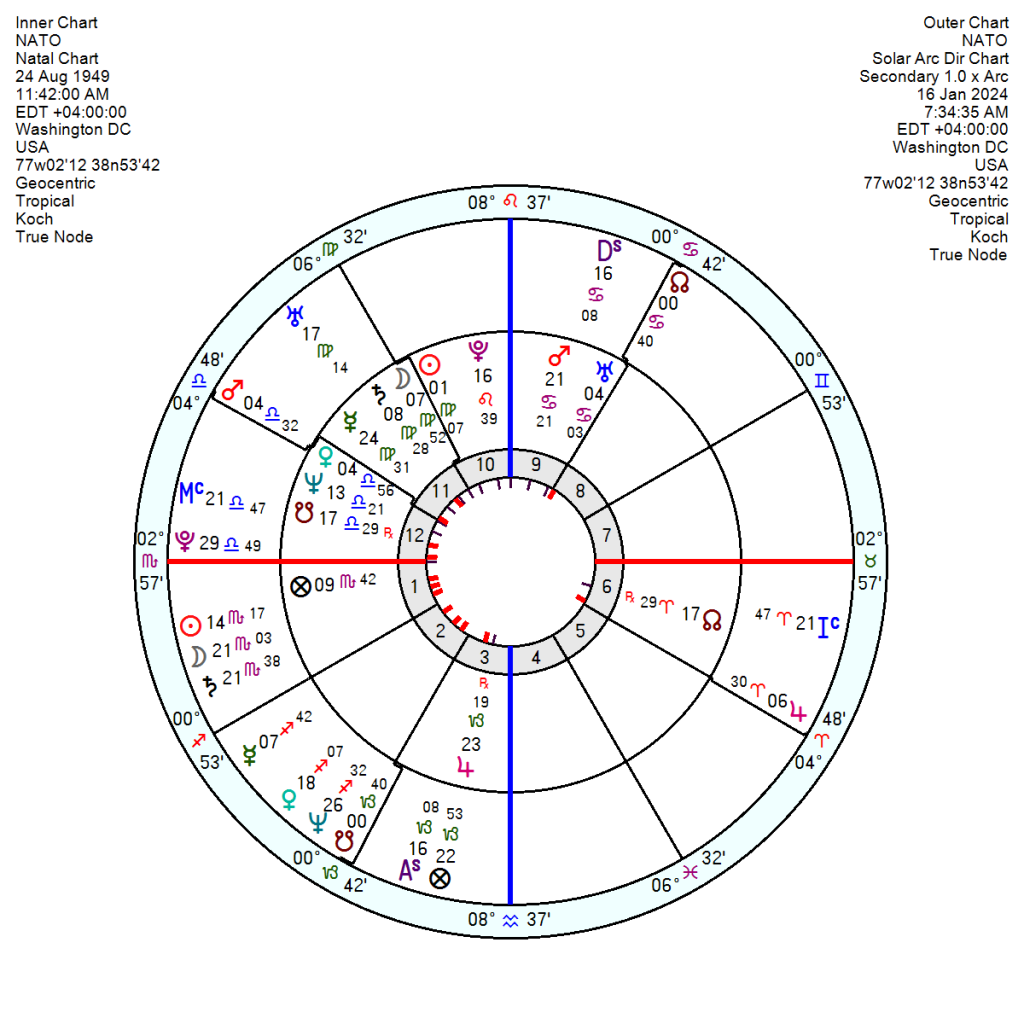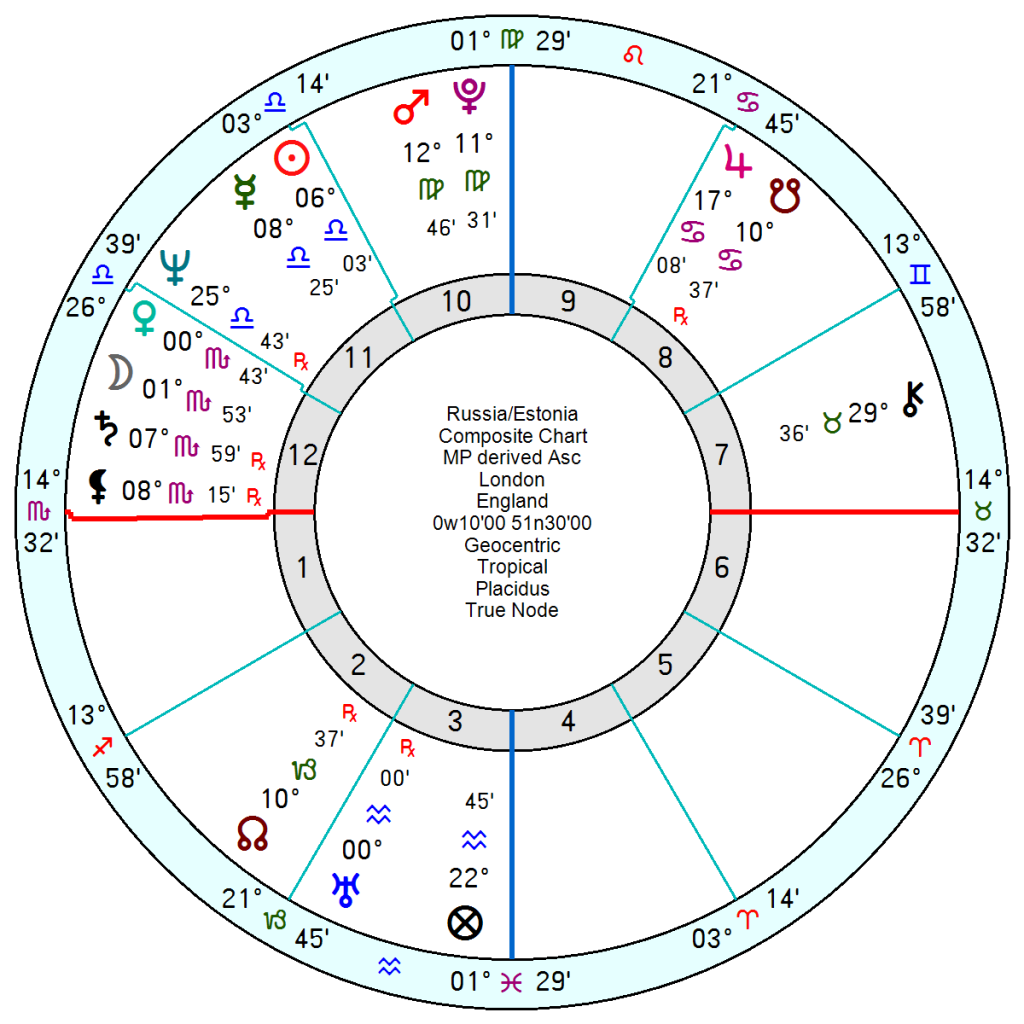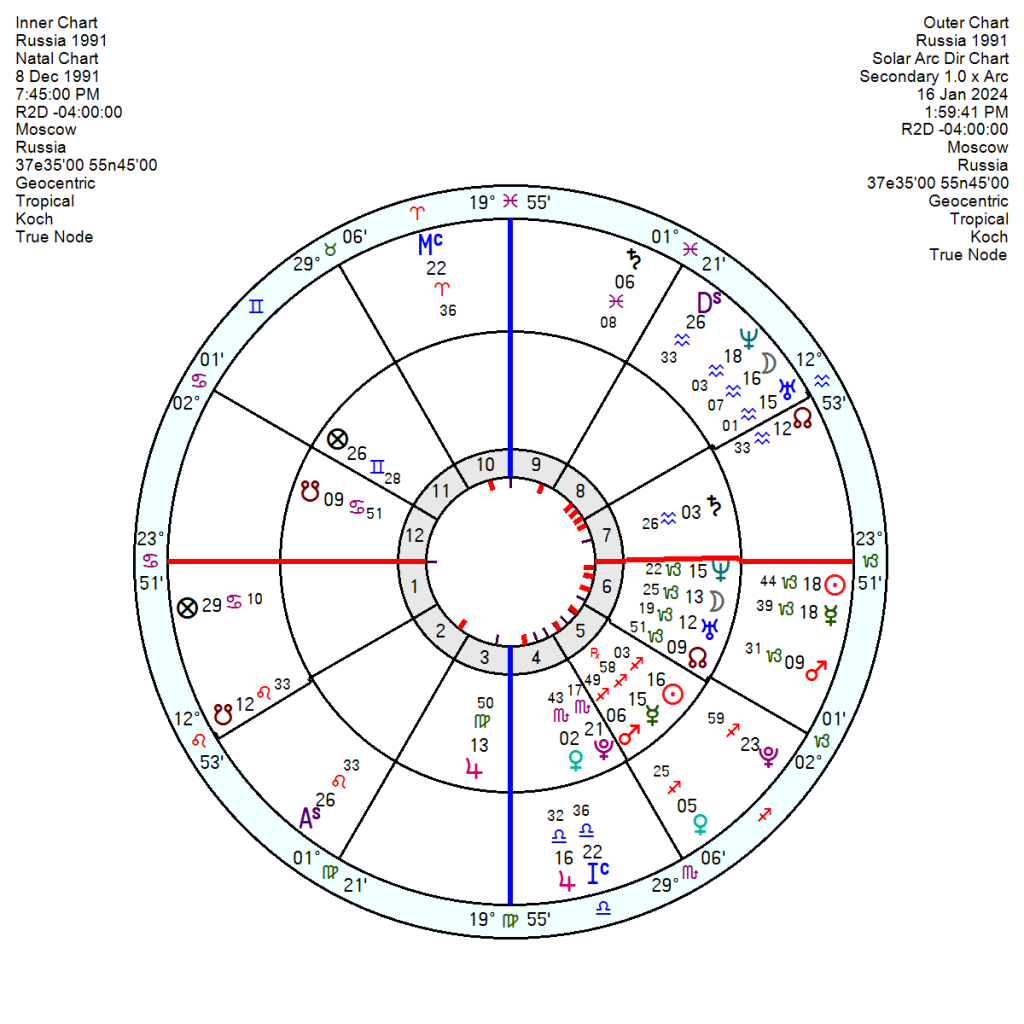



Ominous warnings of possible Russian incursions into neighbouring Baltic countries in the aftermath of the Ukrainian invasion have been voiced in Germany and by the Estonian prime minster. The timescale they foresee is not imminent but it would involve NATO anywhere between three to five or eight years hence.
Having had a quick skip through relevant charts it is clear that Uranus moving into Gemini will be the trigger for all manner of significant unrest with aggravations showing up in the Russia relationship charts with Poland, Estonia, Latvia and Lithuania. Not necessarily instantly but around 2027 and onwards.
The NATO chart itself, 24 August 1949 11.42am Washington, DC, has a Virgo New Moon Saturn conjunction so will be rattled by tr Uranus squares from 2026 onwards. It will be facing major challenges by 2026 with a dead-halt SA Sun square Pluto.
The two Russia charts, 1917 and 1991, both have Mars in an early Mutable sign – Virgo and Sagittarius. And the three Baltic States in their relationship with Russia are flagging up 2027 to 2029 as times of high alert.
The Russia 1917 chart is recording a significant setback later this year after an aggravated start to 2024. The 1991 chart is pointing to an explosive 2027 with SA Mars conjunct the Uranus – though there could also be a major natural disaster with a SA Neptune square the Pluto which often brings devastation.
The NATO/Russia 1991 relationship chart shows a definite downturn in 2025/26 with high tension following. The NATO/Russia 1917 hints at a spike in tension from July this year onwards with the October Solar Eclipse marking a crisis point in both relationship charts.
There really does seem no let up from the doom, gloom and catastrophizing. Though mercifully there is not a hard Saturn Pluto aspect until 2028 – which is what usually accompanies a large-scale war. Not always and not definitive but a small consolation.

As Louisa says, Let’s not forget that future warfare will likely look very different than it has up to now. With the ‘old guard’ gone Russia will most likely concentrate its undermining efforts on its cyberwarfare capabilities which in principle could paralyse nations without firing a single missile or any physical military invasion. Take out a country’s power supply remotely and you will quickly bring it to its knees. Launch such attacks on several countries simultaneously and you hold them hostage. It has already been attempted. NATO and the West generally really need to do more to protect us all against such attacks.
@SuHu, I think you are giving a little bit too little credit to cybersecurity capacities of the “West” here, and Baltic countries definitely come better equipped than most. Russia first attempted large scale attack with Estonia in 2007. Estonians were and are prepared. They – and I’d say most smaller, democratic countries – certainly have an edge over authoritarian regimes, just based on how program development works. It is an area where “flat” organizations, with low hierarchy, with members not afraid of bounce ideas, definitely have an edge.
Therefore, I really don’t see Russia, as a state, being able to pull such operations. Cause some minor nuisances, yes, this, not likely. Especially with younger people fleeing the country.
I take your points Solaia but would be interested to see how you would interpret Marjorie’s analysis of the relationship charts between Russia, the Baltic and NATO. I think Pluto in Aq and Uranus in Gem definitely point to the use of cyber threats to exert power. With Putin gone Russia will likely fall apart and become ever more lawless, I can imagine a situation in which competing regional warlords try to consolidate their power by threatening neighbouring countries, one way or another. But I am also hopeful that it amounts to no more than a war of words.
Kim Jong Un – would he be included in the maelstrom moving toward NATO, now on the horizon?
@ Larryc,
Interesting you mentioned Kim Jong Un, according to various geopolitical and international relations news sources and experts, there has been talk of expanding the North Atlantic Treaty Organization into the North Pacific as well. Countries like Japan and South Korea have expressed an interest in joining the alliance out of concern for North Korea and China’s potential aggression.
I would imagine the Washington Treaty would have to be re-written if such an expansion were to occur.
The Russian Federation invading Poland or one of the Baltic States (Estonia, Latvia, and Lithuania) seems highly unlikely. Since these nations are NATO members, Article 5 could easily be invoked. Also, the Russian Federation may not even have much of a military or a sustainable population by 2027. Russia, like many other countries in the Global North, has an extremely low birth rate (well below the needed 2.1 replacement ratio) and they’ve already lost a considerable percentage of their population due to emigration and premature deaths (from alcoholism, Covid-19, and other health-related and lifestyle issues). Plus, if it’s true (and I know there’s no way of verifying these numbers right now) that the Russian Federation has lost over 360,000 soldiers in Ukraine, then that is also a massive blow.
In other words, it seems more likely that whatever troubles may be ahead will probably manifest in internal troubles for the Russian Federation rather than anything related to its neighbors.
War is a great distraction from internal woes.
@ Larryc,
Yes, it can be. However, war can also exacerbate internal woes. Whenever I recall previous unnecessary conflicts and wars our own government has gotten us into (Nicaragua, Panama, Iraq, etc.), the aftermath has always resulted in some kind of economic downturn or social disruption in our society. That’s been the case for many other nations as well. I’m not convinced the Russian Federation would be immune to such repercussions either.
@Chris Romero, yes, the leaked German document was essentially the worst case scenario. Russian capabilities really aren’t there, and it will take time to rebuild.
An invasion of the Baltic states or Finland is a very real risk because NATO’s strength and resolve has begun to look doubtful as the war has lengthened. Meanwhile the probable next President of the USA is openly hostile to the alliance and his nation’s treaty obligations. Meanwhile NATO’s combined military production capacity has been demonstrated to be risibly insufficient for any large scale war fought in arenas where air supremacy and large scale manoeuvring warfare are impossible. Guided shell production should have been scaled drastically over the last 2 years, and hasn’t been. Meanwhile Western societies have been successfully riven by Russian propaganda and two (Slovakia and Hungary) act as a Russian fifth column in NATO and Europe. With these factors in mind, and the transition of Russia into a heavily militarised fascist state, it isn’t wise to dismiss the threat of invasion or to assume Russia’s current leadership has any remaining reverence for Article 5.
“An invasion of the Baltic states or Finland is a very real risk because NATO’s strength and resolve has begun to look doubtful as the war has lengthened.”
Fortunately, Russian military leaders’ knowledge on Finnish artillery capacities is better than that of random commentators. Traditional invasion to Finland would be guaranteed to cost Russia tens of thousands of casualties in just a matter of week or two. This was the core of the defense before NATO membership (and the reason the US and the UK were not expecting us in). We felt most Russian leaders would not be crazy enough even to try this out.
By ‘random commentators’ I take it you you mean me. Notwithstanding other random commentators’ conventional logic (the type of lazy assumptions the war ought to have put an end to by now) Russia has shown it is quite happy to waste hundreds of thousands of its soldiers’ lives in meat attacks. Finland’s haste in joining NATO ought to reveal how confident it was in relying on its artillery as a deterrent.
Chris, Try absorbing the astrology before throwing out ‘opinions’ of what you would like to be the case. I would not have thought so at first but there are indications of major unrest towards the end of the decade if not slightly before.
As many astrologers have been saying for the past several years, we need to look back to what was happening around the World the last time Pluto was in the final degrees of Capricorn and then into Aquarius. It’s all about upheaval and change. And it’s certainly not about a quiet life or some ‘Camelot’ dream.
@ Ken,
True…if I remember correctly, the American Revolutionary War took place during the last Pluto in Aquarius. So, we might see a lot of upheaval around the world in the upcoming years….but that doesn’t always have to mean a bad thing. It very well could mean many people around the world begin rising up against their oppressors. I would actually welcome that.
With Pluto in Aqua and Uranus in Gemini it makes me wonder how much new technology and communications could be employed in warfare.
@ Marjorie,
I’m not dismissing the astrology…I just prefer not to hypothesize the worst case scenario. While I don’t proclaim to be an expert in political astrology by any stretch (I will leave that for the experts), I am knowledgeable in the field of international relations (even considered majoring in it when I was in university) and I just think the prospect of a full blown continental war between NATO and the Russian Federation in the near future seems unlikely given the lack of resources at Russia’s disposal.
Uranus in Gemini is also problematic because it was when it was in Gemini before that the Civil War in the United States unfolded. I think you mentioned that before, and I also saw it on an astrology message board several months back.